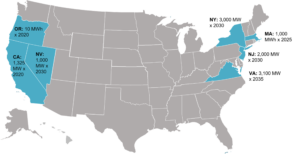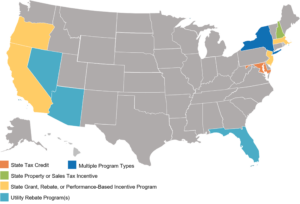DSIRE Adds Energy Storage Incentives and Targets to Database
Raleigh, NC – (April 14, 2020) The N.C. Clean Energy Technology Center (NCCETC) announced the addition of energy storage incentives and state procurement targets to the Database of State Incentives for Renewables and Efficiency (DSIRE). DSIRE is the most comprehensive public source for information on clean energy policies and incentives and is managed by NCCETC’s policy team.
Currently, seven states have energy storage targets, with five of these being adopted or increased within the last two years. Energy storage financial incentives are available in at least ten states; these include rebates, tax credits, sales or property tax incentives, and performance-based incentives.
“It is exciting that enough states have now adopted new policies and incentives for energy storage that trends are emerging, and it makes sense for DSIRE to capture them,” said Brian Lips, Senior Project Manager for DSIRE.
State Energy Storage Targets (as of 4/13/2020)

“We began tracking storage targets and incentives as a part of the 50 States of Grid Modernization report series. Now, as these storage-focused initiatives become finalized rules and laws, the free, online DSIRE database will include them for public consumption, said Stephen Kalland, Executive Director of the NCCETC.
“DSIRE Insight will still be the way to track these types of programs as they work their way through the legislative or regulatory processes, but over time, we plan to include more programs and incentives initially tracked under DSIREinsight products in the free DSIRE database when they are finalized,” added Kalland.
Energy Storage Financial Incentives (as of 4/13/2020)

NCCETC continues to update DSIRE and evolve the database’s contents to reflect the changes happening in the energy industry. The team intends to add additional content related to energy storage in the coming months.
ABOUT THE N.C. CLEAN ENERGY TECHNOLOGY CENTER
The N.C. Clean Energy Technology Center, as part of the College of Engineering at North Carolina State University, advances a sustainable energy economy by educating, demonstrating and providing support for clean energy technologies, practices and policies. It serves as a resource for innovative, sustainable energy technologies through technology demonstration, technical assistance, outreach and training. For more information about the Center, visit: http://www.nccleantech.ncsu.edu. Twitter: @NCCleanTech
MEDIA CONTACT: Shannon Helm, NCCETC, shannon_helm@ncsu.edu